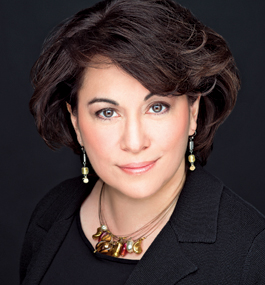A Hunger for Storytelling

Tim Coburn
Alma Katsu ’81
Alma Katsu ’81 spent almost three decades as an analyst at the National Security Agency (NSA), the CIA and the U.S. State Department before becoming a published novelist. This puts her in unusually good company. Before earning their acclaim as writers, both John le Carré and Graham Greene worked for the British intelligence agency MI6.
But Katsu is likely the only storyteller with a security clearance who has penned a fictional account of the real-life Donner Party, a group of pioneers who, snowbound and starving in the Sierra Nevada in 1846, resorted to cannibalism to stay alive. “The Hunger,” Katsu’s new novel, serves up that notorious saga with a twist: Something supernatural surrounds the doomed settlers as they struggle to survive.
Even before publication, an appetite was building for “The Hunger.” Ridley Scott’s production company already has tentative plans to turn the book into a film.
Growing up in Maynard, Massachusetts, Katsu always wanted to be a writer, a dream that picked up steam at Brandeis when the literature major studied with John Irving, then the Fannie Hurst and Jacob Ziskind Writer in Residence, whose novel “The World According to Garp” had just received a National Book Award. “I had never known a novelist,” she says, “so to meet someone at the pinnacle of the profession, I saw it was something real.”
Still, Katsu felt unprepared to start writing fiction right after college. “I had never had any life experiences,” she says, “and I thought you needed life experiences to be a novelist.”
She decided to interview for a job at the NSA, submitting to the battery of tests it gives its applicants. After a change of heart, she told the agency she wasn’t interested in working there and did some freelance writing instead. A year later, out of the blue, the NSA offered her an analyst position. This time, she took it.
Writing intelligence reports taught her how to construct a strong narrative. “When you’re an analyst, you jump right into source materials to quickly make decisions about what is useful,” she says.
After she turned 40, Katsu resolved once and for all to become a novelist. “I told myself that if I didn’t start working on it, it would never happen,” she says. Her first book, “The Taker,” was published nearly 10 years later, in 2011. She wrote “The Hunger,” her fourth novel, while working at a government think tank.
Fiction can lead to clarity, Katsu discovered. “I don’t think we understand life well head-on,” she says. “You understand a problem more when you tell a story than when you tell the facts.”
— Jarret Bencks
